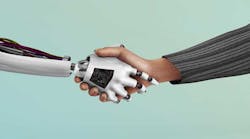On a recent visit to a household products manufacturing plant in California we were awestruck at the miles of machinery humming away on lonely factory floors. Only 75 employees in total were needed to keep this enormous 300,000 square foot facility running 24/7.
It looked like machines rule the day. However on closer examination, we noted that it is the employees – each with an average of 15 years’ experience – who are tapped to perform mission critical tasks that greatly impact the factory’s performance. Tasks like reconfiguring production processes, immediate interventions to address process breakdowns, inspections and troubleshooting issues.
In an era when robots are hitting their stride, humans are still very much necessary.
This is not to say that algorithms, machines and robots won’t replace many existing industrial work activities. According to an article from McKinsey, 59% of all manufacturing activities could be automated. However, humans will still be needed to perform the remaining 41% of activities.
The real world of manufacturing is full of situations that have little structure, predictability or definition. In aerospace manufacturing, almost every aircraft is made to specifications unique to that order –a process that requires extensive engineering attention from human workers. We also easily forget just how often things go wrong — an engine part is delayed because of an unexpected raw material shortage, or the cable wires are too short. These one-time, unpredictable situations can be costly and solving them requires human involvement because unstructured and undefined processes like issues management is hard to automate.
It is a fallacy to think that industrial robots, AI and machines will eliminate the need for industrial workers. By placing too much credence on this fantasy we risk neglecting our most important resource: human potential.
—Yan-David Erlich
Additionally, parts of industrial work will always involve navigating difficult terrain, delicately manipulating heavy tools, and decision-making when there isn’t enough data or information. These situations require the dexterity, mental agility and creative problem-solving abilities of humans.
Automation also places higher importance on non-routine aspects of human work. According to research by Sabine Pfeiffer of the Department of Sociology at the University of Hohenheim in Germany, automation increases the complexity and vulnerability of an overall system as smaller and seemingly insignificant events can affect the whole organization on a bigger scale. In her research at a highly automated car body production plant, Pfeiffer found as many as 20 to 30 human interventions per shift were needed to prevent major flaws in quality and productivity.
In more affluent societies, manufacturing is also becoming an increasingly complex undertaking. Wealthier consumers are demanding an even broader assortment of goods and services. As a result businesses that create these offerings have to reconfigure manufacturing lines and processes continuously. These mass customization scenarios create more complexity in the production processes and new machinery that need more human-driven setup, maintenance and repair.
As automation spreads and robots take over the mundane aspects of manufacturing, there is also an opportunity for industrial workers to spend more of their workday tackling higher value-added tasks. These are critical tasks that robots and AI cannot easily replicate like breakthrough product innovations and efforts to enhance customer satisfaction that can give an organization a leg up over the competition.
To fully tap the potential of Industry 4.0, companies must invest in technology tools, training and processes that can augment and support their industrial workforce as they perform qualitatively more important work. Industrial workers must have the ability to collaborate in real-time, benefit from immediate access to best practices, and have clearer work instructions and operating procedures. In the same way that desk-bound workers have a plethora of productivity, collaborative, project management and workflow technology tools to choose from, so too should the desk-less industrial workforce.
Companies must also invest in training to build new skill sets among their high performing workers. In order to succeed in an Industry 4.0 world, industrial workers will need both job specific knowledge and digital skills like creating spreadsheets, working with new technology interfaces and even programming.
It is a fallacy to think that industrial robots, AI and machines will eliminate the need for industrial workers. By placing too much credence on this fantasy we risk neglecting our most important resource: human potential.
We also risk derailing our efforts at Industry 4.0. According to PWC’s 2016 Global Industry 4.0 Survey, the biggest challenge to the successful transformation and execution of Industry 4.0 isn’t the technology – it’s the people. We are dependent upon the digital qualifications of the employees who we need to roll out digital processes and services, says the report.
I subscribe to a human-centric Industry 4.0. Here connected industrial workers, supported and augmented by technology, are equally crucial for success as advanced AI and industrial robotics. It is the man-machine collaboration that will ensure our factories reach new levels of efficiency, competitiveness, innovation, safety, and productivity.




